|
|
|
Sort Order |
|
|
|
Items / Page
|
|
|
|
|
|
|
| Srl | Item |
| 1 |
ID:
067372
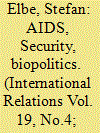

|
|
|
| 2 |
ID:
110834
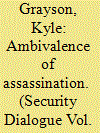

|
|
|
|
|
| Publication |
2012.
|
| Summary/Abstract |
This article begins by presenting a biopolitical account of assassination and targeted killing events carried out by liberal regimes. It argues that forms of political violence are understood and made meaningful beyond the administrative frameworks and technical rationalizations often privileged in biopolitical analyses. Deploying Alan Feldman's (1991) argument that political violence is an 'emplotted action' alongside William Connolly's (2005) notion of resonance, it provides a genealogical account of how forms of assassination have been positioned within Western cultural understandings of political violence. The focal point of examination is the biblical heroine Judith, whose story has resonated as a preferred narrative structure for understanding and (de)legitimating acts of assassination among Western publics. Through its reading of the book of Judith, the article highlights the importance of ambivalence for understanding assassination as a form of political violence. The legacy of the moral problematique enabled by Judith is then illustrated in relation to US President Barak Obama's May 2011 speech announcing the killing of Osama Bin Laden. The article concludes by suggesting that although the story of Judith may underpin contemporary assassination practices, it also offers a means of critically engaging with them.
|
|
|
|
|
|
|
|
|
|
|
|
|
|
|
|
| 3 |
ID:
090164
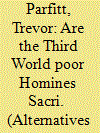

|
|
|
|
|
| Publication |
2009.
|
| Summary/Abstract |
This article examines how the concept of biopolitics is applied in development studies, focusing especially on Giorgio Agamben's account of biopolitics as intrinsic to the analysis of sovereignty and a state of exception. Agamben analyzes sovereignty as a biopolitical enterprise of disciplinary control in which sovereign power is able to enforce its role by the most draconian means while remaining nominally within the law. Agamben further claims that development is a biopolitical enterprise through which the Third World poor are reduced to a situation of bare life. The article interrogates this proposition, questioning how far biopolitics/development must necessarily be conceived as an exercise in oppression.
|
|
|
|
|
|
|
|
|
|
|
|
|
|
|
|
| 4 |
ID:
153017
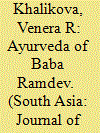

|
|
|
|
|
| Summary/Abstract |
This paper examines a cultural politics of nationalism and alternative medicine in India. It investigates the rhetoric of a popular guru, Ramdev, who criticises ‘the West’ and promotes ‘homegrown’ yoga and Ayurveda for strengthening individual bodies and the body of the nation. I argue that the expansion of the Ayurvedic market in India and Ramdev's personal success are both based on discourses that interweave a neo-liberal quest for health with nationalist sentiments and consumerist desires. I show how yoga and Ayurveda—situated within narratives of citizens’ duty to consume the homegrown—have become political tokens of national belonging and biomoral consumerism.
|
|
|
|
|
|
|
|
|
|
|
|
|
|
|
|
| 5 |
ID:
044595
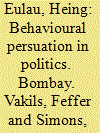

|
|
|
|
|
| Publication |
Bombay, Vakils, Feffer and Simons, 1963.
|
| Description |
x, 153p.
|
| Series |
Perspective series
|
|
|
|
|
|
|
|
|
|
|
|
Copies: C:1/I:0,R:0,Q:0
Circulation
| Accession# | Call# | Current Location | Status | Policy | Location |
| 023008 | 320.019/EUL 023008 | Main | On Shelf | General | |
|
|
|
|
| 6 |
ID:
127803
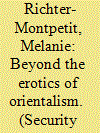

|
|
|
|
|
| Publication |
2014.
|
| Summary/Abstract |
Contrary to commonsense understandings of torture as a form of information-gathering, confessions elicited through the use of torture produce notoriously unreliable data, and most interrogation experts oppose it as a result. With a focus on the US carceral regime in the War on Terror, this article explores the social relations and structures of feelings that make torture and other seemingly ineffective and absurd carceral practices possible and desirable as technologies of security. While much of international relations scholarship has focused on the ways in which affective and material economies of Orientalism are central to representations of the 'terrorist' threat, this article connects the carceral violences in the racialized lawfare against Muslimified people and spaces to the capture and enslavement of Africans and the concomitant production of the figure of the Black body as the site of enslaveability and openness to gratuitous violence. The article further explores how these carceral security practices are not simply rooted in racial-sexual logics of Blackness, but themselves constitute key sites and technologies of gendered and sexualized race-making in this era of 'post-racial triumph' (HoSang and LaBennett, 2012: 5).
|
|
|
|
|
|
|
|
|
|
|
|
|
|
|
|
| 7 |
ID:
188467
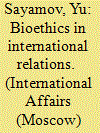

|
|
|
|
|
| Summary/Abstract |
THE PRESENTATION of Biblioteka bioetiki [The Library of Bioethics] at the Ministry of Foreign Affairs of the Russian Federation offered an occasion to return to the discussion of the global challenges facing humanity amid unprecedentedly rapid and radical changes to the world and international relations. This unique 10-volume publication, prepared on the initiative of Academic Alexander Chuchalin, chairman of the Russian Committee on Bioethics, draws upon the creative legacy of outstanding thinkers of the past and inspires contemplation of the present in which the range of bioethical problems is constantly expanding and occupying an increasingly important place in anxious reflections on the future of civilization.
|
|
|
|
|
|
|
|
|
|
|
|
|
|
|
|
| 8 |
ID:
190755


|
|
|
|
|
| Summary/Abstract |
Why do individuals engage in violence against the state? This research investigates the biological and environmental determinants of individual-level participation in political violence through the use of a Candidate Gene Association, gene-environment interaction, study. Existing research has demonstrated that variation in a specific gene (called MAO-A) is associated with aggression. However, relatively little scholarly attention has been paid to the interaction with the environment; specifically, the ways in which repressive political environments differentially incite acts of violence. Using original genetic, survey and experimental data collected on participants and non-participants of political violence, I find that under conditions of political repression, individuals with the low MAO-A genetic variant are significantly more likely to engage in acts of political violence. By examining both the genetic and environmental factors influencing political violence, the results make a significant contribution to our understanding of how genetic variation may lead to violence.
|
|
|
|
|
|
|
|
|
|
|
|
|
|
|
|
| 9 |
ID:
192576
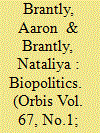

|
|
|
|
|
| Summary/Abstract |
COVID-19 and the subsequent global response have had a profound impact on the public health, economic health, and political health in nearly every country. This article examines the biopolitics of power and pandemics in war. Three case studies are presented: the Spanish influenza outbreak of 1918–1920 and responses to the COVID-19 outbreak in both Syria and in eastern Ukraine. The pandemic’s impact has been particularly acute in active warzones, undermining the ability of governments and organizations to enforce public health recommendations, provide for the care of patients, secure supplies, and transmit information.
|
|
|
|
|
|
|
|
|
|
|
|
|
|
|
|
| 10 |
ID:
032529
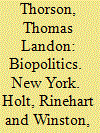

|
|
|
|
|
| Publication |
New York, Holt, Rinehart and Winston, Inc., 1970.
|
| Description |
vii, 216p.
|
| Standard Number |
0030831423
|
|
|
|
|
|
|
|
|
|
|
|
Copies: C:1/I:0,R:0,Q:0
Circulation
| Accession# | Call# | Current Location | Status | Policy | Location |
| 008742 | 306.2/THO 008742 | Main | On Shelf | General | |
|
|
|
|
| 11 |
ID:
159157
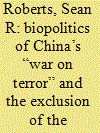

|
|
|
|
|
| Summary/Abstract |
This article provides an overview of People’s Republic of China (PRC) counter-terrorism policies targeting Uyghurs since 2001 when the state first asserted that it faced a terrorist threat from this population. In reviewing these policies and their impact, it suggests that the state has gradually isolated and excluded Uyghurs from PRC society. Drawing on the writings of Michael Foucault, it articulates this gradual exclusion of Uyghurs as an expression of biopolitics where the Uyghur people as a whole have come to symbolize an almost biological threat to society that must be quarantined through surveillance, punishment, and detention. Rather than suggesting that these impacts of China’s “war on terror” coincide with the intent of state policy, the article argues that they are inevitable outcomes of labeling a given ethnic population as a terrorist threat in the age of the Global War on Terror.
|
|
|
|
|
|
|
|
|
|
|
|
|
|
|
|
| 12 |
ID:
086147
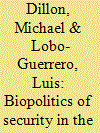

|
|
|
|
|
| Publication |
2008.
|
| Summary/Abstract |
This essay addresses two questions. It first asks what happens to security practices when they take species life as their referent object. It then asks what happens to security practices which take species life as their referent object when the very understanding of species life undergoes transformation and change. In the process of addressing these two questions the essay provides an exegesis of Michel Foucault's analytic of biopolitics as a dispositif de sécurité and contrasts this account of security with that given by traditional geopolitical security discourses. The essay also theorises beyond Foucault when it interrogates the impact in the twentieth century of the compression of morbidity on populations and the molecular revolution on what we now understand life to be. It concludes that 'population', which was the empirical referent of early biopolitics, is being superseded by 'heterogenesis'. This serves as the empirical referent for the recombinant biopolitics of security in the molecular age.
|
|
|
|
|
|
|
|
|
|
|
|
|
|
|
|
| 13 |
ID:
068361
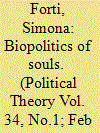

|
|
|
| 14 |
ID:
137616
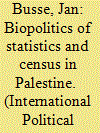

|
|
|
|
|
| Summary/Abstract |
This article addresses the importance of statistics for governing populations in the context of Palestine. On the basis of Michel Foucault's understanding of governmentality, I argue that social statistics represent crucial biopolitical technologies of governmentality. While statistical knowledge as a modern phenomenon originated in Western Europe in the late eighteenth and early nineteenth centuries, the case of Palestine clearly shows the importance of modern statistics beyond the OECD world. In a first step, I will elaborate on the emergence of social statistics as modern phenomena for governing populations. In this regard, the “discovery of the population” represents a fundamental prerequisite for the “birth of modern statistics” and the systematic utilization of statistical data for governing purposes. On this basis, I will argue social statistics are of crucial importance for governing the daily lives of the Palestinian population. Moreover, I will present the emergence of Palestinian statistics as a global phenomenon. It will become evident that social statistics and inferred demographic politics are essential for the sustainment of societal order in Palestine. This is particularly so regarding related inclusionary and exclusionary dynamics—namely Palestinian nation-building on the one hand and the Palestinian–Israeli demographic contestation on the other.
|
|
|
|
|
|
|
|
|
|
|
|
|
|
|
|
| 15 |
ID:
081210
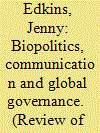

|
|
|
|
|
| Publication |
2008.
|
| Summary/Abstract |
In the aftermath of the 7th July 2005 bombings in London, communication with those searching desperately for relatives and friends was one-way or non-existent. The authorities dealing with the processes of the identification of the bodies of those killed or the treatment of those injured adopted procedures and protocols derived from emergency or disaster planning that were framed in terms of an instrumentalisation or objectification of persons. This article traces how these procedures reflect biopolitical forms of global governance that involve the production of life as 'bare life' and details how inappropriate and brutal these forms of governance seemed both to those searching for the missing and to the London Assembly 7th July Review Committee. It concludes that attention needs to be paid to the proliferation of such forms of politics as administration and the objectification they entail before we reach a stage where all life becomes nothing more than bare life, life with no political voice as such.
|
|
|
|
|
|
|
|
|
|
|
|
|
|
|
|
| 16 |
ID:
141100
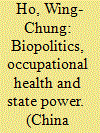

|
|
|
|
|
| Summary/Abstract |
This article endeavours to address the experience of Chinese workers with occupational disease as an instantiation of Agamben's notion of homo sacer – the ultimate biopolitical subject whose life is located outside the “normal” political, economic and cultural practices and, hence, is rendered largely silent and unintelligible in the public realm. It argues that the victimization of the occupationally sick worker has become almost a blind spot at the centre of governmentality insofar as the specific set of social regulations and power relations has created a “double ambivalence” among the victims who are constantly and disturbingly caught in between the public and private, the productive and unproductive, and the culturally normative and the culturally deviant. Such experiences of marginality contribute to the understanding of the biopolitical nature of contemporary Chinese state power, which adopts extensive “stability maintenance” (weiwen) measures to reduce resisters to a state of “bare life” susceptible to the rule of exception.
|
|
|
|
|
|
|
|
|
|
|
|
|
|
|
|
| 17 |
ID:
060630
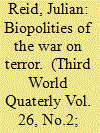

|
|
|
| 18 |
ID:
192008
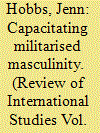

|
|
|
|
|
| Summary/Abstract |
This article examines the soldiering body in relation to the increasing prevalence of genitourinary injuries in military personnel. Feminist scholars have demonstrated that the idealised masculine soldiering body are central to the workings of international politics. The article shows that US militarised masculinity operates through the selective distribution of bodily capacities. The article draws upon critical disability studies, particularly Jasbir Puar's work on capacity and debility, to argue that treatments for genitourinary injuries revolve around the production of seminal capacity. Queer and trans bodies are debilitated in these arrangements through the denial of heterosexual and cisgender capabilities to them. To unpack this argument the article analyses treatments for genitourinary injuries. The article shows that genitourinary injuries destabilise the gender identity of US service members. Through an exploration of surgical treatments, including penis transplants and reconstructive surgeries, and fertility treatments, the article shows how masculine capacitation is achieved for some US service members through the debilitation of others; in particular, queer and trans bodies, and the bodies of Iraqi and Afghan civilians.
|
|
|
|
|
|
|
|
|
|
|
|
|
|
|
|
| 19 |
ID:
132953
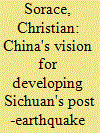

|
|
|
|
|
| Publication |
2014.
|
| Summary/Abstract |
In the aftermath of the 2008 Wenchuan earthquake, government officials, scholars and outside observers eagerly hoped that the emergency relief and reconstruction process would bring about the emergence of civil society and increase grassroots democratic participation. Contrary to this optimistic assessment, this article contends that the local state used the opportunity of the disaster as an experimental laboratory to implement an array of already existing national development plans. The urgency with which the reconstruction was to be completed and the opportunities to meet national development targets as well as access reconstruction funds were too tempting to resist. However, the ham-fisted Leninist implementation style met with local resistance and has contributed to a significant deterioration in local state-society relations. The fact that many local residents continue to question why, despite the huge resources invested by the state in the reconstruction project, they have yet to see any improvement in their economic and overall living conditions points to a deficit of local participation and a breakdown in political communication and trust. By focusing on the different political economies of disaster reconstruction, this article attempts to illuminate the regime's vision for developing the countryside, rural politics, and state-society relations in China more broadly. Unless the state is able to incorporate local needs into its development plans, it will not win the trust and support of local residents, regardless of the amount of money it invests or the benevolence of its intentions.
|
|
|
|
|
|
|
|
|
|
|
|
|
|
|
|
| 20 |
ID:
172952
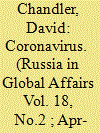

|
|
|
|
|
|
|
|